The Chief Investment Officer Panel – where leading UK fund managers debate the big issues of the day – is always a real draw at Dynamic Planner’s Annual Conference.
This year was certainly no different. On 5 February, fittingly amidst the history and heritage of the IET in London, six CIO’s, or their equivalents, gathered on stage in the Kelvin Lecture Theatre for 60 minutes of insight, debate, opinion and humour – all masterfully chaired by the inimitable Simon Jack, Dynamic Planner’s Conference host again in 2020.
But which industry issues grabbed the spotlight and gaze of such a knowledgeable panel? Risk today and what we can expect from global markets in 2020 kicked proceedings off before the discussion turned to encapsulate a myriad of issues and subjects currently dominating conversations.
Climate change and its increasing impact on investing; the coronavirus; the fallout from Woodford; asset allocation or stock picking – which is more important? Are Apple and Google just too big for their boots today? How do asset managers self-police to avoid another Woodford? And, finally, what one thing keeps them awake at night?
Answering the questions were: Abhi Chatterjee, Chief Investment Strategist at Dynamic Planner; Chris Forgan, Portfolio Manager with Fidelity International; Chris Jeffery, Strategist – Asset Allocation at Legal & General Investment Management; Hector Kilpatrick, CIO at Cornelian Asset Managers; John Ricciardi, Lead Manager & Head of Global Asset Allocation with Merian Global Investors; and Rupert Rucker, Head of Income Solutions at Schroders.
Below is what they said.
Risk-on, or risk-off in 2020?
Rupert Rucker [Schroders]: “Risk-on still, despite the coronavirus in China. That means at Schroders that we’re overweight with equities in a multi asset portfolio – and we still think there’s an upside in markets, particularly outside the US.”
John Ricciardi [Merian Global Investors]: “Risk-on, has it has been for the last couple of quarters. Maximum equities; minimum bonds. Underweight in major markets, compared to emerging markets. And within major markets, underweight US, overweight in Europe.”
Simon Jack: “When you talk about ‘maximum equities’, what kind of allocation are you talking about?”
John Ricciardi: “We can take at Merian a 50 per cent world equity allocation and 50 per cent global bond allocation as standard – and from there we work on the allocation to earn our ‘value add’ for investors. We can go as high as 80 per cent in equities.”
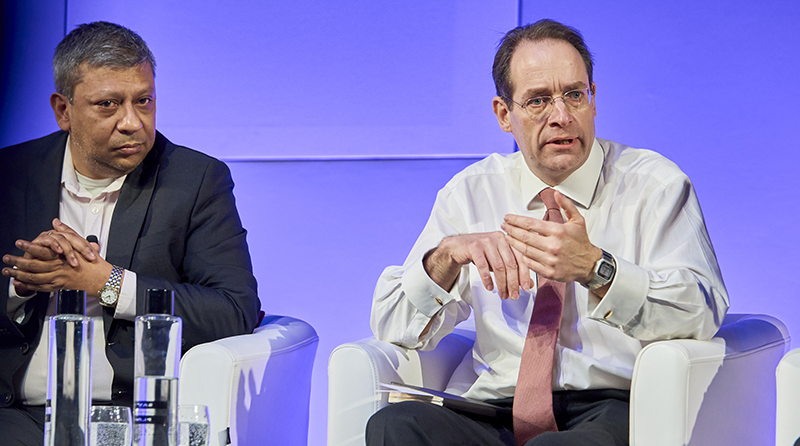
Hector Kilpatrick [Cornelian Asset Managers]: “Risk-on and currently overweight in equities compared to our standard position at Cornelian. But we are very short on risk in credit and government bonds, in particular.”
Abhi Chatterjee [Dynamic Planner]: “We don’t worry about risk being on or off, at Dynamic Planner we just worry about risk all the time! [Laughter.] In our asset allocations currently, we are tending to hold more cash and less bonds, but we balance it out.”
Chris Forgan [Fidelity International]: “Currently at Fidelity, we are modestly risk-off and mostly underweight in equities as a result.”
2020: A ‘very different’ beast to 2019
John Ricciardi: “We think 2020 is going to be very different to last year, which had very little chance for economic growth or a rise in earnings, which is how 2019 turned out when the US Federal Reserve cut interest rates from 3% to 1.5%. This year is very different: there is very little chance we will see lower interest rates; more chance they will be higher.”
Chris Forgan: “Expectation of an economic upswing in 2020 has been fairly tentative until perhaps the last few weeks, which is why we have been a touch more cautious. Structurally, we have tilted away from the US and more towards the Far East and Asia.”
Simon Jack: “In the search for yield, where does that take you?”
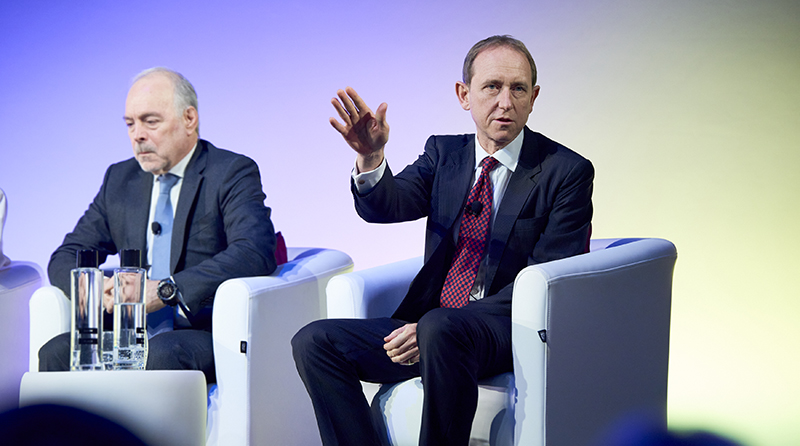
Rupert Rucker: “In 2020, returns are not going to be as high, so the income part of any investment then becomes much more important, particularly the dividend. Extracting that will be a big part of the total return – but that has been the case historically anyway.”
Hector Kilpatrick: “At Cornelian, we are currently overweight in equities, but not hugely. We are concerned that any economic upswing is not going to come through as people are perhaps hoping for.”
Abhi Chatterjee: “We are very low on illiquid assets currently. We just don’t want to get heavily into physical property, which can get locked up, so to speak. We also feel there are pockets in markets where people have overbought, like fixed income or high yield bonds.”
What has the fallout been from the Woodford scandal?
Simon Jack: “Woodford was a moment when fund managers were not covered in glory and has shone a light on an issue like illiquidity. Are you mindful of that now?”
John Ricciardi: “There are approaches here, if you’re not looking at particularly stock picking – it depends upon where your ‘value add’ comes from as a manager. You can structure portfolios and we’ve done it at Merian for five or six cycles where we’re holding for example 600 stocks and the average capitalisation is £100bn.
“That gives you massive liquidity, but that’s not your ‘value add’ – that comes from going up or down the risk scale and from making the kind of bets we’ve already talked about, like being underweight in the US.”
Rupert Rucker: “The problems which came last year with Woodford came from the distrust they engendered. One thing fund managers need to do, of course, is control capacity. That is an internal discipline that must take place to cap the amount of assets a fund can manage, according to the daily liquidity. But all of the funds the people on this panel manage are all controlled by capacity and third-party risk so that we can control that liquidity.”
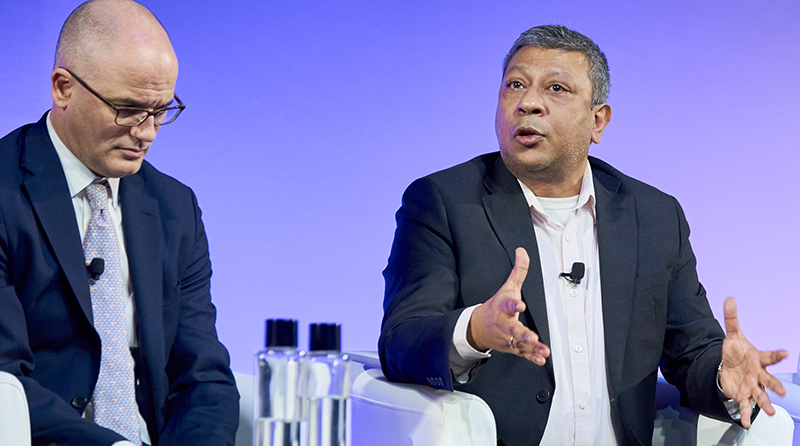
Abhi Chatterjee: “Illiquidity risk is like any other type of risk – there are two sides to the coin. During the accumulation phase of a portfolio, a bit of illiquidity premium helps add to the return. However, during decumulation and when you’re selling down units within that portfolio, that’s when it becomes a problem.”
What’s more important: Asset allocation or stock picking?
Rupert Rucker: “If a manager is providing an outcome, which is difficult to deliver – e.g. an income outcome or a volatility outcome – that takes asset allocation to deliver and fund managers charge fees for that expertise and skill. In terms of stock picking, if you’re looking to deliver anything over the markets, you have to pick the right stocks. But fund managers, without doubt, have to deliver both, because they charge fees.”
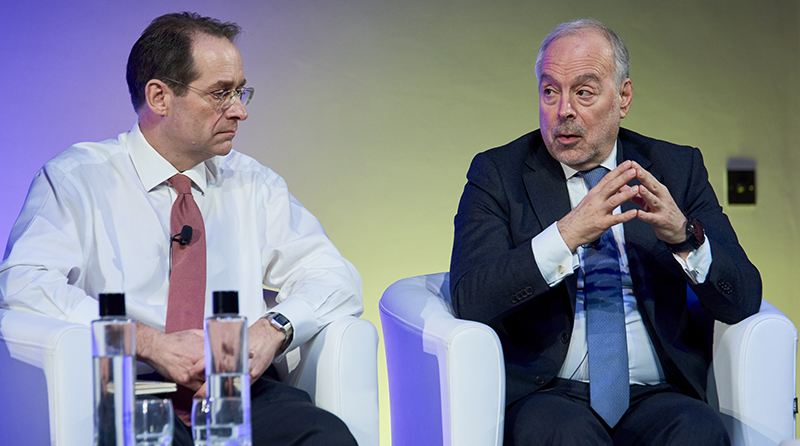
John Ricciardi: “If you look at the numbers historically, for example in the US, around 70 per cent of returns was really dependent upon how much risk a manager took from year to year. Another 20 per cent comes from choice or asset allocation and how a manager engenders risk – i.e. in bonds, in equities, derivatives. Of the remaining 10 per cent, five of that comes from stock picking or manager picking – and the final five per cent is random.
“So if you quote a stat that 90 per cent of fund managers underperform markets, you’re really looking at that five per cent and that ‘value add’ that managers can add if they know how to arrange risk – i.e. when to take risk and achieve returns and when not to take risk.
“If you want to beat the markets, you need some kind of active information and you need to see if a manager can bring that information to bear through asset allocation and through risk. As we’ve said already today, ‘How does your manager bring ‘value add’ to a portfolio, so that you can measure it?”
Simon Jack: “Abhi, at Dynamic Planner, how do you check that a fund is doing what it says on the tin?”
Abhi Chatterjee: “We look each quarter at a fund’s assets, holding by holding to calculate its risk profile. If a manager’s fund changes risk profile, we can then have a conversation with them to look at that. That is fund risk profiling. In risk target managed funds, the manager cannot go outside the respective risk profile’s boundaries. They are committed to a fund’s risk profiles.
“We can also measure a fund against our MSCI benchmark asset allocations, which we know the risk of. If a fund is able to outperform the Dynamic Planner benchmark for its risk profile, good for the manager.”
Are corporate giants like Apple and Google today simply too big for markets?
Simon Jack: “Today, when you consider giants like Apple and Google etc. it feels that any retraction in those stocks puts markets in trouble. Is that not the case?”
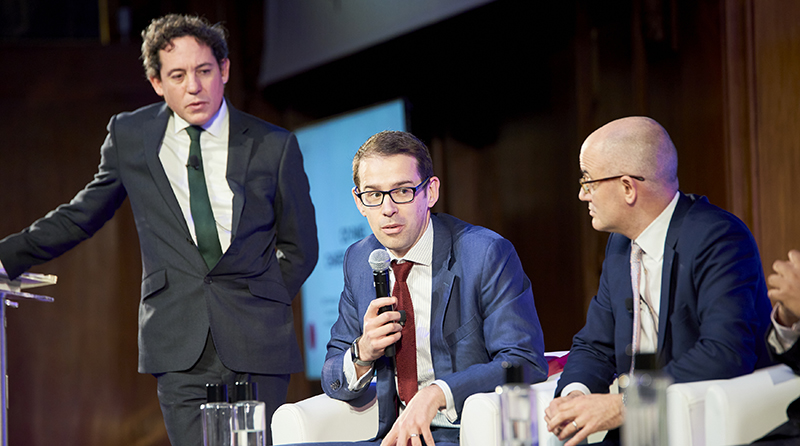
Chris Jeffery [Legal & General Investment Management]: “Yes, you’re worried that you haven’t got many eggs in many baskets, which is entirely reasonable. Of course, managers will look at total returns and how much of that comes from perhaps only a handful of stocks, like it hasn’t before at any point historically. So, yes, it is very hard not to worry at a global level about risk coming from that tech sector.”
Simon Jack: “How do you kick your funds’ own tyres, so to speak, when it comes to risk and self-police?”
Hector Kilpatrick: “If you’re considering an asset allocation movement that comes with a significant risk, you check that and ensure it remains within the parameters that you have set yourself.”
John Ricciardi: “At Merian, we set ourselves maximums and minimums for holding different percentages of assets. We also do high intensity modelling to help us and which map economic growth, for example, to equity markets; and map inflation to bond markets; and map liquidity and economic policy to currencies.
“That modelling gives us likely outcomes for the next six to eight weeks for different asset classes. For example, in 2018, before the September, October and November drop in markets, we went all the way down the risk scale to maximum equity in bonds.”
Rupert Rucker: “At Schroders, our products are designed for the long-term and are consistent with the investment journey an advice firm has bought into with their clients’ capital, to deliver the outcome they want. The biggest risk is that the fund manager doesn’t do that and that instead they change their process in a way no one could anticipate.”
Simon Jack: “That was so on message. Three points to Gryffindor!” [Laughter.]
Chris Forgan: “I would echo all the thoughts we have just heard and add that all the fund managers here tackle risk on a daily basis and the potential impact of changing portfolios. One key point, which is often underestimated, is that statistics don’t always capture everything going on in a portfolio – unless protection is there.”
How is the issue of climate change today affecting how portfolios are managed?
Chris Jeffery: “I think there is a ladder of appetite for this and at L&G, as a result we offer people a ladder of options that look at different things like corporate governance, for example and something like sustainability. But we have to be quite careful here. There isn’t a ‘one size fits all’ solution.”
John Ricciardi: “Ultimately, it is a client’s money which is being invested by a manager and it has to be run in the way that the client wants. There is lots to consider. Is a firm which attracts investment just trying to be passive and trying to do no harm – or is it taking active measures to have a positive impact for such considerations?
“At Merian, we have an entire team looking at risk like this and who analyse information available on every company and every country in the world, which measures things like governance and like social. Ultimately, they will reach different scores for different funds.”
Abhi Chatterjee: “At Dynamic Planner, we’re getting a lot of requests about how a fund scores here. It is a difficult thing to measure, but we can see demand is there and it is only growing. It is up to us to provide advice firms with the right tools.”
Hector Kilpatrick: “With the best of intentions, everyone sets the bar differently, so the labels the industry currently uses here are inconsistent.”
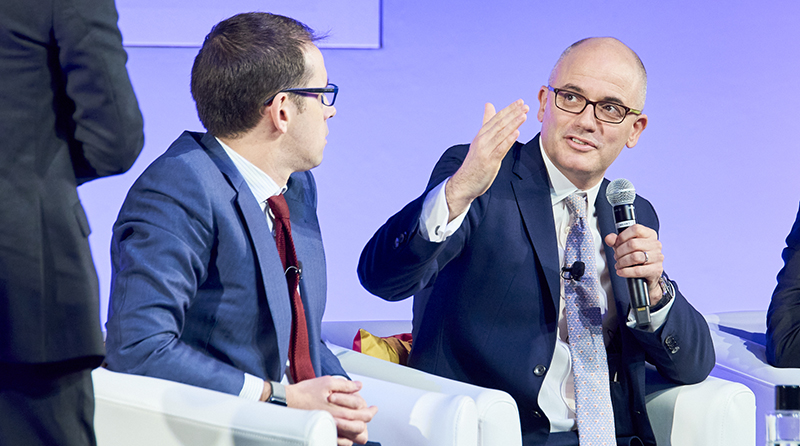
Chris Forgan: “I think it’s about appreciating what specific issue a client has and then designing a product to provide a solution, rather than choosing one already out there but which is very broad and generic in how it meets a requirement.”
The coronavirus – at what point do you start taking real notice of it?
Chris Jeffery: “You have to be very, very cautious I think, because if a fund manager pretends to understand virology as well as he understands markets, he would probably be lying. The honest answer is we don’t know what is going to happen and my advice would be, ‘Don’t pretend to know the answer here’.”
John Ricciardi: “I think you have to manage something like this in terms of probability, because you get external shocks to the system. You can’t just run for the hills here, in terms of being defensive, because then what if you miss out on the recovery and the returns you are aiming to deliver to your clients?”
What one thing keeps you awake at night?
Rupert Rucker: “The lack of trust currently in the industry and another Woodford happening.”
Chris Jeffery: “Aside from my two-year-old daughter, latent inflation. It’s not here today, but we are constantly watching to see if it is going to return.”
Chris Forgan: “Credit risk.”
Abhi Chatterjee: “Again, inflation and credit risk.”
Hector Kilpatrick: “Extraordinary monetary policy becoming normal monetary policy. I think that’s very dangerous. Also, I think we could be sleepwalking into a debt trap, but that’s maybe for another day.”
John Ricciardi: “I’m worried about China’s large, important economy having a dictatorship on technology to control its population and what that means for humanity.”
For more information on how Dynamic Planner can help your firm, book a demo with one of our team.



